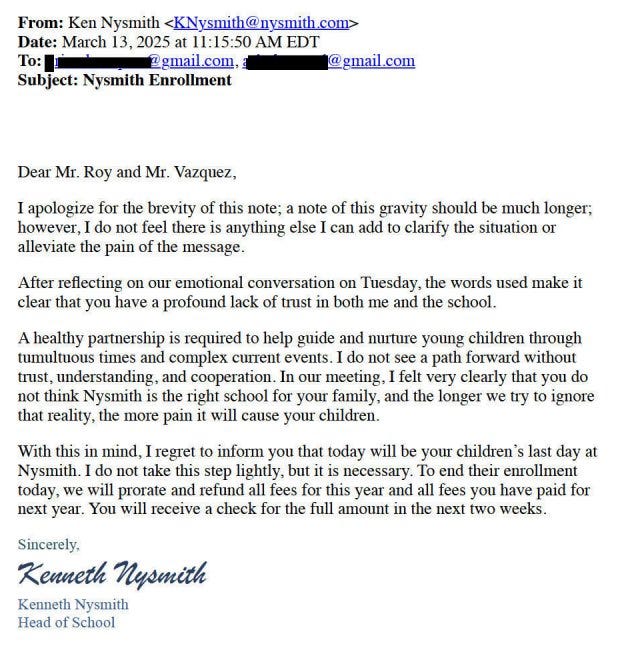Washington, Virginia, New Jersey, & Massachusetts: The Rising Tide of Antisemitism in K-12 Schools
Antisemitism in educational settings is surging, leading to civil rights complaints as Jewish students face severe harassment, often met with tepid or even antagonistic responses from school officials
In recent weeks, incidents of antisemitism in K-12 schools across the United States have been increasingly reported, prompting civil rights complaints and lawsuits. Several cases have emerged where Jewish students faced severe harassment, with little to no effective action taken by school officials to address the issue. These events occur alongside a disturbing uptick in antisemitic hate crimes, including a sharp increase in states like Massachusetts.
Nysmith School and the Expulsion of Jewish Students
A notable case covered by the Washington Free Beacon involves the prestigious Nysmith School in Northern Virginia, where three Jewish students were allegedly expelled after their family reported sustained antisemitic bullying. The harassment intensified after the school displayed a Palestinian flag in its gym, with students facing taunts and threats, some of which were linked to Hamas’ October 7th attack.
Despite the family's efforts to address the issue with school administrators, the bullying continued until the students were expelled just before the school’s mid-semester break, further igniting allegations of discrimination and a hostile environment.

The complaint, filed by the Brandeis Center under Virginia’s Human Rights Act, accuses the school of fostering an environment “hostile to Jews.” The harassment began shortly after Hamas’ October 7th attacks, with Jewish students targeted for their identity, subjected to name-calling, and even accused of being responsible for violence in Gaza. The failure of the school’s headmaster, Kenneth Nysmith, to take appropriate action exacerbated the situation, with the family’s concerns dismissed and the expulsion following shortly after their last meeting.

Cherry Hill School District Failing to Address Antisemitism
In New Jersey, the parents of a Cherry Hill high school student filed a federal lawsuit against the district after their son was targeted with threats and harassment because of his Jewish identity and support for Israel. The harassment began after Hamas’ October 7th attacks, with the student being surrounded by a group of peers who threatened violence against him.
In the days that followed, other students allegedly cornered him in a bathroom, warning him that “Jews are not safe here” and threatening to beat him if he posted anything in support of Israel on social media.
The district's response was deemed inadequate, as the family claims that school officials minimized the incidents and retaliated against their son. Despite the serious nature of the threats, the district failed to take meaningful action to protect the student. In a settlement, the district agreed to issue a statement condemning antisemitism, but this was buried in an obscure section of the district’s website and never directly communicated to families.
A Surge in Antisemitic Hate Crimes in Massachusetts
In Massachusetts, antisemitic hate crimes surged by over 20.5% in 2024, marking a disturbing shift in the state’s hate crime landscape. For the first time in nearly 35 years, anti-Jewish crimes outpaced those against Black individuals. This rise in antisemitism is linked to broader societal tensions, particularly following the Israel-Hamas war. The state recorded 153 hate crimes related to religious bias in 2024, with antisemitism comprising 85% of those incidents. As local Jewish leaders and advocacy organizations call for stronger responses to hate, the lack of a unified, proactive approach at the school level remains a critical issue.
A concerning example of this is the situation in Concord-Carlisle Regional School District, where two public schools—Concord-Carlisle High School and Concord Middle School—have been accused of allowing an “alarming pattern of antisemitic bullying, slurs, threats, and retaliation.” A student, identified as “Student A,” was subjected to frequent harassment after the school taught about the Holocaust in 2023.

Despite multiple meetings with administrators, the bullying continued. Administrators’ responses, including trivializing antisemitic slurs and retaliating against the victim, led to Student A eventually transferring to a private school. A filing from the ADL notes that while this case focuses largely on one student, it highlights systemic issues in the district.
Seattle High School’s Failure to Protect Jewish Students
The situation in Seattle, Washington further highlights the severity of the problem. At Nathan Hale High School, a lawsuit was filed by the family of a Jewish student who faced persistent verbal abuse, threats of physical violence, and even spitting from classmates. Despite multiple reports to school officials, including Principal Dr. William Jackson, the situation escalated with no meaningful intervention. Similar to other incidents, the harassment began following Hamas’ October 7th attacks and worsened during a walkout in support of Palestine, where the student was surrounded and physically threatened by a group of peers.
The complaint describes a pervasive culture of antisemitism at Nathan Hale, with students drawing swastikas and making derogatory comments during Holocaust studies. The administration’s failure to address the issue allowed students to continue their harmful behavior. After a particularly violent incident in May 2024, where the student was forced to hide in a classroom for safety, the family filed a lawsuit accusing the district of negligence and intentional infliction of emotional distress.
Addressing the Gaps
The rise in antisemitism across U.S. schools highlights serious shortcomings in how school districts address and prevent harassment. Despite rising incidents and clear evidence of hostile environments, many schools continue to fail in providing adequate protection or implementing effective policies. This situation calls for a more comprehensive and proactive approach to ensure that all students, regardless of background, can learn in an environment free from discrimination and fear.




I blame jews